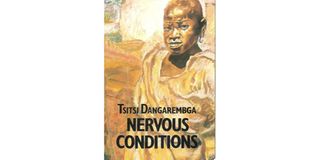Premium
‘Nervous conditions’ among hustlers as going gets tough

Tsitsi Dangarembga the winner of the 2021 PEN Pinter Prize and author of the book ‘Nervous Conditions’.
What you need to know:
- The narrative revolves around Tambudzai Sigauke (or simply Tambu), a Zimbabwean woman who struggles through life looking for opportunities for a better life.
- Throughout her life, Zimbabwe has haunted the writer (Dangarembga), tormenting her like an abusive lover — she has spent most of her life writing searing prose excoriating the country’s swashbuckling politicians.
- In many ways, the “nervous conditions” cited in the book are a metaphor for the fragility of our own struggles in Kenya today.
In a few minutes I shall feel under my feet that secret land which I loved as much as I hated it; which satisfied me as no other country did and yet let me hunger as none had done before… in whose hot deserts I had thirsted and in whose icy tundras I had wept because of the cold… that which robbed me of five years of my young life but which repaid me ten-fold with a wealth of experiences… The long-forgotten smells came back: old leather mixed with the odour of sour bread, the stink of coarse Russian tobacco and there was also a new smell, a gamey odour, the sort of smell met with in gypsies…. most noticeable among the captured Mongolian troops.”
These words from the German soldier-poet Erich Dwinger are about Soviet Russia, a country that haunted him after he had fought in it during the Second World War. He writes about this experience in Wiedersehen mit Sowjet-Russland (A Date with Soviet Russia) as he crossed into Russia for the first time after the war.
He brings up an important issue: the country one loves can be a source of rage, disappointment and suffering. Home can also be where the heartbreak is.
Most Nairobians have experienced this, especially those starting out in life. They know what it means to feel like a leper without a home — lonely and hungry, sitting at Uhuru Park as people walk by and, from a distance, Nairobi looking metallic, brusque and impervious like a cruel city. The stench of business hanging heavy in the air — everything costs money and one has to be constantly on the lookout for conmen, scammers, thieves, money-hounds and other wannabes.
Dangerous place. Newcomers always felt small and shrunken, muffled by the vastness of the city. Or bleary-eyed, tears streaming down as one walks in a shambling gait down the street, trailed by foggy air.
Long-forgotten smells
The city is full of new smells. The sharp odour of new fabric. The smell of food. Nairobians with a rural background long for the scent of the long-forgotten smells of home; the smell of rain and wet earth, and the misty picture of a basket of vaguely remembered wild fruits from a distant afternoon in childhood. Home, it has been said, is where the heart is.
But home can also be where the hurt is — like an ash heap after smouldering wreckage. What does one do when one’s country brings moments of weariness, anger and dissatisfaction?

The cover of the book Nervous Conditions by Zimbabwean writer Tsitsi Dangarembga.
That’s the central issue in Nervous Conditions by Zimbabwean writer Tsitsi Dangarembga. The narrative revolves around Tambudzai Sigauke (or simply Tambu), a Zimbabwean woman who struggles through life looking for opportunities for a better life.
Throughout her life, Zimbabwe has haunted the writer (Dangarembga), tormenting her like an abusive lover — she has spent most of her life writing searing prose excoriating the country’s swashbuckling politicians.
In many ways, the “nervous conditions” cited in the book are a metaphor for the fragility of our own struggles in Kenya today. The nervous conditions faced by Tambu are abject poverty and the challenges faced by people trying to achieve their goals in life and the odds they must overcome to succeed.
Tambu goes for higher education, hoping that her situation will improve; it doesn’t. The book introduces us to the numerous struggles that people experience in their life journeys. Tambu is a metaphor not only for the lives of Zimbabweans but also for Kenyans especially the so-called “hustlers”.
In the run-up to the general elections, there was a lot of hope among hustlers. The campaign promises were juicy—conjuring up a utopian world that now seems to have been yanked from the grasp of many by cold reality.
Several months after the Kenya Kwanza administration took over, much is required to meet our moment of economic upheaval: the cost of food, fuel and other essentials has increased. So far, President Ruto seems to be struggling to untangle the muddle and government action has been, somewhat adrift, scattered as if Kenya were a patient without clear symptoms and the doctor is still trying various prescriptions.
The words of BBC’s Andrew Fernando (describing Sri Lanka in crisis) could apply to Kenya, “There are long days to be lived; work days, errands to be run, daily essentials to be bought at twice the price they had been… you’re starting a little more broken than you were last week. Once you’ve had breakfast—eating less than you used to, or perhaps nothing at all—the battle to find transport beckons”.
There is a lot of economic hardship in Kenya. The signs are everywhere: in the mothers carrying their babies as they beg for change in the streets, in the sweaty men breaking their backs under the blazing sun for barely enough to buy a loaf of bread, in the degree holders increasingly holding up handwritten banners in busy streets announcing that they are qualified but can’t find jobs.
Kenya can be annoying. It stretches our patience. However, since Kenya is our home, we should not give up. We should envision and work towards new realities to generate new possibilities for ourselves and our children. In the words of a line from our national anthem, “Let one and all arise”.





